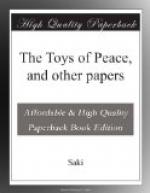“I am a von Cernogratz myself,” said the old woman, “that is why I know the family history.”
“You a von Cernogratz? You!” came in an incredulous chorus.
“When we became very poor,” she explained, “and I had to go out and give teaching lessons, I took another name; I thought it would be more in keeping. But my grandfather spent much of his time as a boy in this castle, and my father used to tell me many stories about it, and, of course, I knew all the family legends and stories. When one has nothing left to one but memories, one guards and dusts them with especial care. I little thought when I took service with you that I should one day come with you to the old home of my family. I could wish it had been anywhere else.”
There was silence when she finished speaking, and then the Baroness turned the conversation to a less embarrassing topic than family histories. But afterwards, when the old governess had slipped away quietly to her duties, there arose a clamour of derision and disbelief.
“It was an impertinence,” snapped out the Baron, his protruding eyes taking on a scandalised expression; “fancy the woman talking like that at our table. She almost told us we were nobodies, and I don’t believe a word of it. She is just Schmidt and nothing more. She has been talking to some of the peasants about the old Cernogratz family, and raked up their history and their stories.”
“She wants to make herself out of some consequence,” said the Baroness; “she knows she will soon be past work and she wants to appeal to our sympathies. Her grandfather, indeed!”
The Baroness had the usual number of grandfathers, but she never, never boasted about them.
“I dare say her grandfather was a pantry boy or something of the sort in the castle,” sniggered the Baron; “that part of the story may be true.”
The merchant from Hamburg said nothing; he had seen tears in the old woman’s eyes when she spoke of guarding her memories—or, being of an imaginative disposition, he thought he had.
“I shall give her notice to go as soon as the New Year festivities are over,” said the Baroness; “till then I shall be too busy to manage without her.”
But she had to manage without her all the same, for in the cold biting weather after Christmas, the old governess fell ill and kept to her room.
“It is most provoking,” said the Baroness, as her guests sat round the fire on one of the last evenings of the dying year; “all the time that she has been with us I cannot remember that she was ever seriously ill, too ill to go about and do her work, I mean. And now, when I have the house full, and she could be useful in so many ways, she goes and breaks down. One is sorry for her, of course, she looks so withered and shrunken, but it is intensely annoying all the same.”
“Most annoying,” agreed the banker’s wife, sympathetically; “it is the intense cold, I expect, it breaks the old people up. It has been unusually cold this year.”




